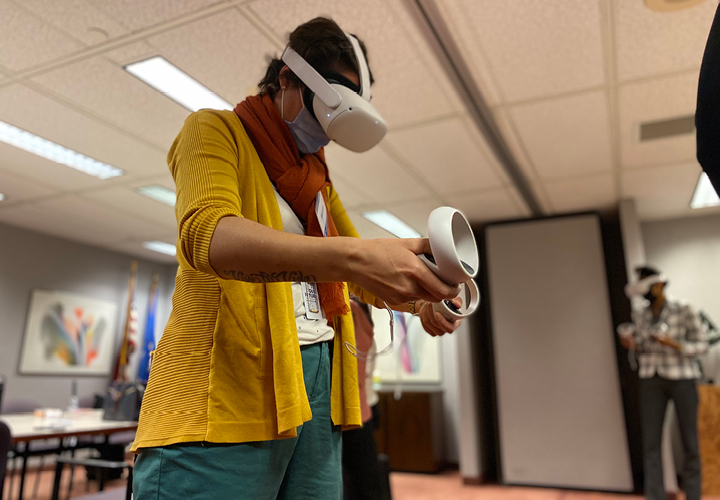Virtual Reality Pilot Program Exposes Students to Manufacturing

CBIA affiliates ReadyCT and CONNSTEP are piloting a virtual training program designed to spark interest among high school students in manufacturing careers.
Recognizing that today’s middle and high school students are true digital natives, the pilot program uses state-of-the-art virtual reality technology to expose students to modern manufacturing opportunities.

ReadyCT project coordinator Deb Presbie said these new methods of teaching and learning have great impact potential, with the ultimate goal of attracting students to the manufacturing workforce.
“After a quick login and securing a safe perimeter, students will find themselves in a manufacturing facility,” Presbie said.
“The space is new and colorful, and at every angle, the user begins to engage in activities connected to manufacturing careers.”
Collaboration
The program, offered through collaboration between CONNSTEP and ReadyCT, will run throughout the 2021-2022 academic year, bringing virtual training labs to students in classrooms across Connecticut.
The program is funded through a $10,000 grant from America Works, an initiative of the Manufacturing Extension Partnership National Network, of which CONNSTEP is a member.

“We are looking to leverage classrooms in a way that meets students where they are,” explained Presbie. “Once we get the headsets into the hands of teachers, counselors, and students we’ll be collecting feedback on what is and is not working.
“In particular, we want to see whether the technology Is increasing students’ interest in the area of manufacturing as well as whether students are developing manufacturing skills.”
Simulations
Of the five TRANSFRVR headsets obtained through the grant, two are dedicated to raising awareness of manufacturing careers, and three are programmed to develop and practice manufacturing skills.
With both options, a student dons a headset, while using two hand controllers to manipulate tools and equipment in a simulated manufacturing environment.
Students use hand controllers to manipulate tools and equipment in a simulated manufacturing environment.
In one program, students use micrometers and other measurement tools to complete various tasks. In another, students are taught and later quizzed about how to inspect a crane.
“The career exploration simulations can be used by middle and high schools in their guidance activities to expose students to manufacturing occupations,” said Presbie.
“The virtual training simulations focus on developing skills in areas such as precision measurement, safety, blueprint reading, and mechatronics, and can be integrated into already existing manufacturing programs.”
Schools Pilot
Following an October demonstration of the technology to teachers and business leaders, Presbie said a number of schools expressed interest, including Tourtellotte Memorial High School in Thompson.
Teacher Michael Joyce said he is interested in putting it to the test and gaining momentum for the district’s manufacturing program.
“It would be nice for students to see some things that they don’t have in their lab,” Joyce said.
Joyce said in the last year, interest in the sector has grown, as exemplified through higher enrollment numbers in manufacturing courses.
High school teacher Michael Joyce wants to use the pilot to gain momentum for the district’s manufacturing program.
According to Joyce, deploying the headsets might interest a new group of students.
He believes the school can use it for students to try during down time in the library to learn about manufacturing, or during their courses.
“Hopefully it will give kids a good idea of what they are getting into,” he said.
The district offers college credit classes including manufacturing, blueprint reading, and an introduction to engineering.
‘Great Tool’
They are not the only ones interested in the technology.
Matt Dadona, head of Goodwin University’s Advanced Manufacturing Program at the Connecticut River Academy, said they are looking to loan the headsets for a few weeks.
“I thought it was pretty neat,” Dadona said about his experience putting on the headset for the first time.
He said he has tried various online learning programs to teach the skills of manufacturing to students, and it is a challenge.
“What better opportunity is there than to use these really cool VR headsets to increase exposure to manufacturing.”
ReadyCT’s Deb Presbie
While he feels there is no real replacement for being in a shop, he believes TRANSFRVR is a great tool right now to get students interested in manufacturing.
Presbie said other districts that don’t have labs think it would be helpful to immerse students in a different type of hands-on learning.
The plan is for ReadyCT to loan headsets to schools for four weeks at a time so they can try out the technology and provide feedback.
“The Connecticut Manufacturers Collaborative has been talking for a long time about the manufacturing pipeline and the need to promote manufacturing as a career choice and we thought, what better opportunity is there than to use these really cool VR headsets to increase exposure to the manufacturing industry,” Presbie said.
ReadyCT is also looking to loan the technology for manufacturers to bring to events at schools.
For more information, contact ReadyCT’s Deb Presbie, project coordinator for the Manufacturing Skills for CT initiative.
RELATED
EXPLORE BY CATEGORY
Stay Connected with CBIA News Digests
The latest news and information delivered directly to your inbox.


